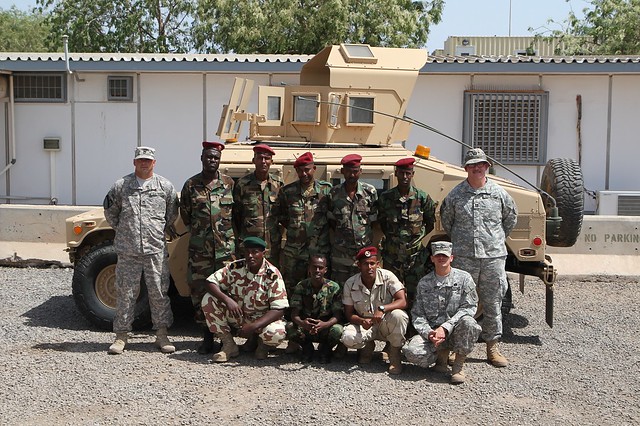Story and photos by Capt. Daniel Van Horn, Task Force Longrifles Public Affairs
[caption id="" align="aligncenter" width="576"]

Soldiers of 2nd Battalion, 138th Field Artillery and local mechanic gather for a group photo at Camp Lemmonier, Djibouti. The military to military engagement was offered to ensure mechanics understood the maintenance of vehicles assigned to Combined Joint Task Force Horn of Africa. (U.S. Army National Guard photo by Capt. Daniel VanHorn)
CAMP LEMONNIER, Djibouti – Preventative maintenance checks and services are the key to maintaining military vehicles used on a daily basis. The 12 mechanics that make up the Task Force Longrifles maintenance section are some of the most experienced in the Kentucky Army National Guard and collectively can diagnose and fix any problem on any military vehicle.
So it’s no surprise the Joint Forces Land Component Command assigned to Combined Joint Task Force-Horn of Africa reached out to Task Force Longrifles to support a recent military-to-military engagement focused on how to conduct a PMCS with Djiboutian military mechanics. The maintenance section accepted the mission and provided two of their best mechanics to lead the class, Sgt. 1
st Class David Corbin from Lawrenceburg, Ky., and Staff Sgt. Michael Miers from Vine Grove, Ky.
Corbin has been an Army mechanic for 16 years and was assigned as the mission commander responsible for planning and coordinating the 3-day engagement. Miers served as assistant commander for the task, bringing 11 more years of professional mechanic experience.
Overall, the engagement began with introductions, handshakes, and a tour of the maintenance shop, followed by the group circling around a high mobility multi-wheeled vehicle to begin the first part of the PMCS class.
“About 45 minutes into the class, one of the Djiboutian mechanics began asking questions about transfer case exchange ratios,” Corbin said. “This was an extremely advanced question and took me by surprise. I suddenly realized that our class was way too basic for these guys and we would need to change the focus of our class immediately.”
Corbin and his team decided to ask the Djiboutian mechanics exactly what they wanted to know more about.
The team was surprised to learn that in 2005 the US government had provided three maintenance support devices to the Djiboutian military mechanics to help them troubleshoot and fix engine problems in their own HMMWVs. However, the group never received the proper training on how to effectively use the computers, so they just sat around in their shop collecting dust.
“We use the MSD computers every day, and they are an essential tool when it comes to working on our HMMWVs,” Miers said. “Teaching them (Djiboutian military) how to use these computers would make a lasting impact for their entire maintenance section and tremendously help them identify problems their vehicles are having.”
For their part, the Djiboutian soldiers were thrilled to learn how each computer worked and huddled around the device taking meticulous notes. After each question, Miers or Corbin would coach them through the process of using the MSD to correctly identify the problem.
“By the end of the first day we knew that this mission had already been a huge success,” Corbin said.
Warrant Officer Abdourazak Djibril, the Djiboutian chief mechanic was very glad for the interaction with the US mechanics.
“This mission has been very beneficial,” Djibril said. “I look forward to future partnerships where we can exchange more lessons about vehicle maintenance.”
At the conclusion of the mission, the Djiboutians were presented with graduation certificates and a joint picture of everyone standing together in front of a HMMWV.
For Corbin though, it wasn’t just a picture.
“It symbolized the many lessons we learned from each other and serves as a reminder of what we can do when we all work together.”